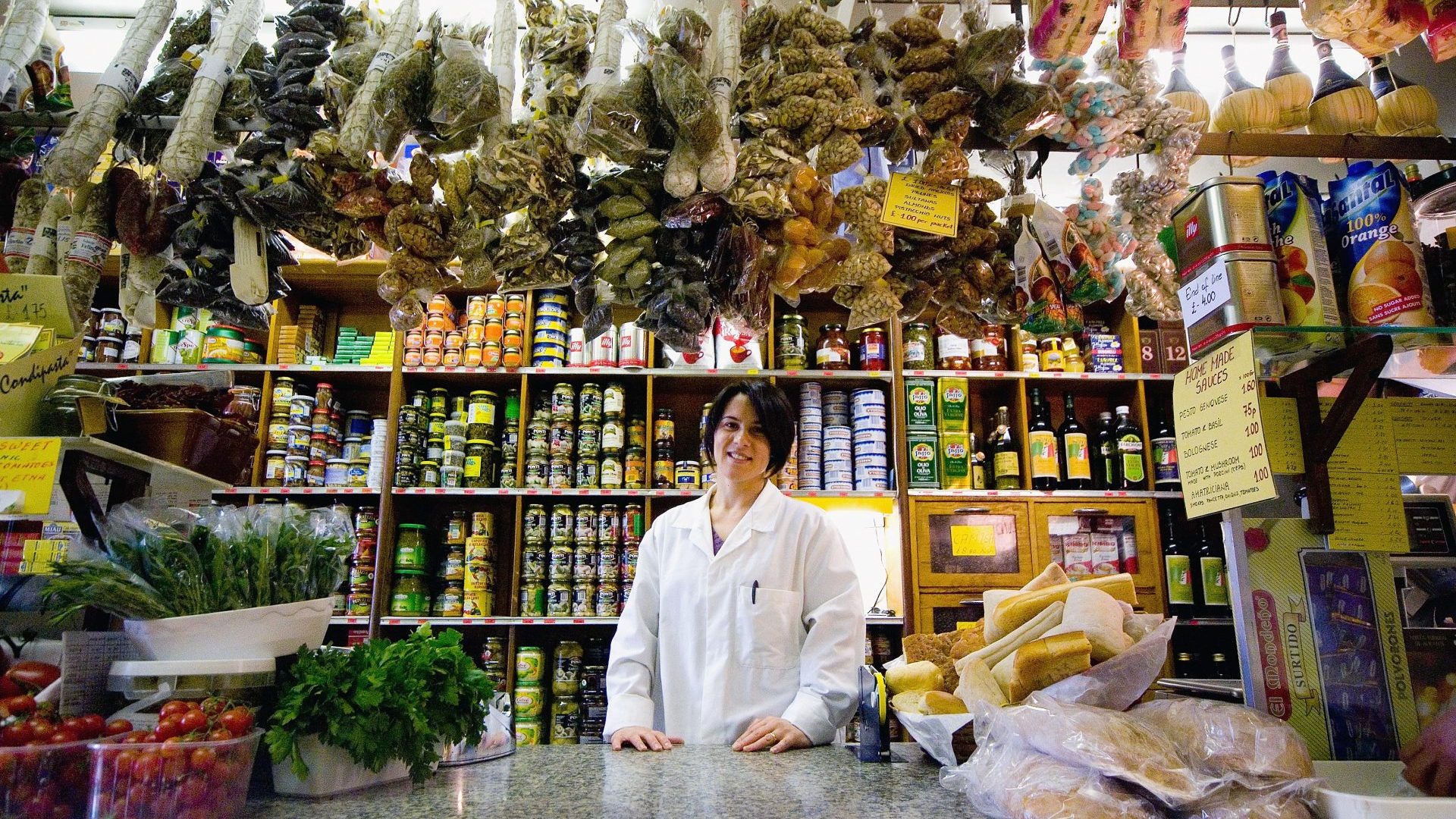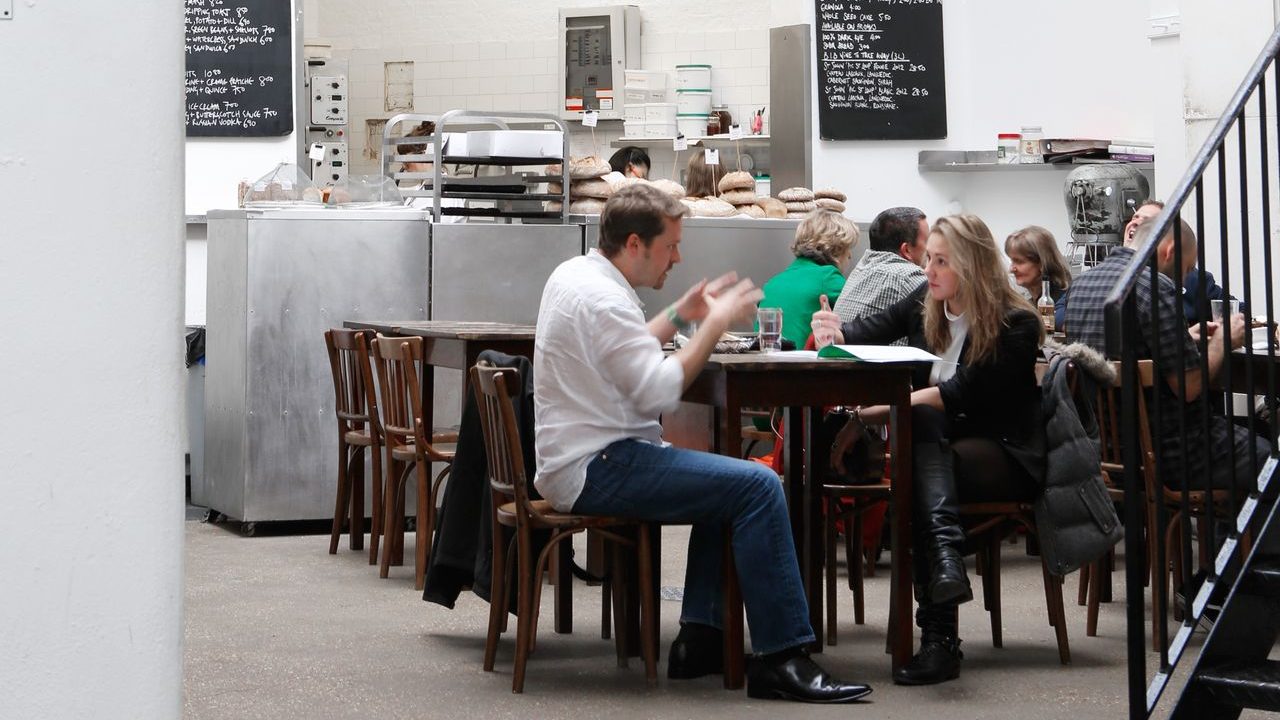In the heart of Soho is an Italian deli now closed: I Camisa, a near-100-year-old relic of a bygone era, where speciality produce, once a rarity in Britain, was sold to the food lovers of London. Any ambitious dinner-party host intent on recreating a fine Elizabeth David recipe would have stopped there, possibly after a necessary pint in Norman’s or the French.
Pastas, homemade sauces, imported meats and cheeses were par for the course, and at lunchtime, fine foods such as mortadella, pecorino and rocket would be generously folded into freshly baked bread – ciabatta, in recent decades – and carried away into the waiting hedonism of the postcode’s debaucherous lanes. A calming bookend tempering the drinks to come.
Camisa closed for good on August 3, having been open in Soho, in some form and in various locations, since 1929. It was launched by Italian brothers Ennio and Isidoro Camisa as Fratelli Camisa on Old Compton Street, but when the second world war began, the authorities closed Italian businesses down and sent many of the then 20,000 or so Italians – who, before the 1950s and 60s, mostly came from the north – to prisoner of war camps.
Isidoro ended up on the Isle of Man with the likes of Charlie Forte (Rocco’s dad) and my nonna’s father, Carlo. After the war, the two brothers opened up in a new location before parting ways (their wives did not get on) to run their own respective shops, each a bastion of the Soho community.
Camisa became an institution; a soulful, romantic shop loved by locals, tourists, celebrities. Nigella Lawson was a fan and would often urge her followers to visit, so too the likes of Stephen Fry, Miriam Margolyes, and the food critic Tom Parker Bowles.
The doyenne of London food writing, Fay Maschler, last mentioned Camisa only two years ago while writing about the late chef Alastair Little. It even featured on the Great British Bake Off and Stanley Tucci sang its praises on one of his boring travel shows. I once stopped in there with the chef Fergus Henderson while I was interviewing him for Vice.
There was much uproar in 2022 when Camisa was first hauled back into the fickle lens of public consciousness. The pandemic had been something of a final(ish) nail in the coffin and the dirty word of “rent” was lambasted by almost all.
In a post-lockdown world, with so many working increasingly from home, footfall fell by up to 60%. These pressures were compounded by Shaftesbury, the property investment group that owns the building, seeking to reimpose the reported £100,000-a-year rent.
Gianni Segatta, of the food importer Alivini, which has owned Camisa since 2014, told me at the time: “We cannot run the business now. It’s very sad. It’s a historical brand and we love it, but everything is so difficult.
“We don’t want to close it down, but in the end it’s pointless to carry on as we’re losing too much [money].”
But Camisa was legendary: thousands called on Westminster Council to engage with Shaftesbury and find a solution to allow the deli to continue. Camisa’s longevity was all – many want to protect Soho and what makes it such a special part of London.
Actors, musicians, journalists and Soho residents all spoke out in support. One, Tim Lord from the Soho Society, told the Guardian: “There are very few things left now in Soho that are unique to Soho. And if we lose those we will just have a very dreary high street. When you talk to people about Soho, the things they always mention are key, small independent businesses like Camisa. And there is no obvious way of protecting them.”
Two years ago, after much community spirit, Camisa was saved. But only for so long.
This time around, the shop’s closure has been mourned; sentiments shared. But most appear resigned to its demise. Why?
Rents are high, sure, but it is also apparent that times have changed. Italian food is everywhere. Camisa remained a famous and charming port of call that provided people with nostalgic moments, but the brutal truth is that people don’t go food shopping in Soho any more. They haven’t for years. They go to eat and drink as they have always done, but grocery shops with fine produce exist all over London.
Those who want or can only afford any old prosciutto and everyday parmesan will head to Tesco, where such delights have been on shelves since the late 1990s. Waitrose for those with ample money but little time.
It is a sad fact and a damning indictment of modern Britain. Then again, should we really be scathing about convenience? For all the memories, knowledge has spread and British food has improved hugely. We should celebrate the richness of our larder as we bid a sullen ciao to one of the names that helped to create it.
In any case, the Camisa family saw all this coming a long time ago, Sam Camisa, the grandson of Isidoro, tells me.
“For the last 15 years, the building was self-financing and the shop didn’t pay rent,” he tells me. “So even when business suffered, it could always compete.
“It’s all very complicated. Simply put, my grandfather signed a very long lease many years ago, the sort you don’t get any more. Everyone said he was stupid, but it meant that years on, he had the option to buy. That came with the flat above – the whole building. He wasn’t even the highest bidder on the property, but the owners at the time [not Shaftesbury] didn’t want to sell to the person who was.”
Sam tells me that business was still strong when the family sold to Alivini, but it was undeniably tougher than in the 1980s and 90s, when millions more were truly waking up to Italian cuisine and it was no longer confined to the vintage trattorias and clubs of Soho. And with the sale came a new business agreement – a new lease, one that came with modern rents.
“There’s no doubt things got much tougher after 2000,” Camisa says. “You could no longer drive into Soho and park outside, for example, which people would do when they wanted specialist Italian produce and the service that you got.
“As much as the food was important, it was as much about coming in for a chat and getting to know people. My grandfather knew what he was doing, playing up to the stereotype. And he was savvy – he did photoshoots long before anyone thought about taking pictures of delis.
“And then there’s the convenience of bigger shops and suburban supermarkets. The quality is never as good, but it’s time and money. It was the same on a commercial level – we used to supply The Ivy, Pizza Express and Caprice, but eventually they moved to bigger wholesalers. It’s business. We were fighting against a changing world. I’m sad to see it close, but my father and I aren’t surprised.”
Today, Sam Camisa – and countless more besides – worry about the other historic premises that make Soho: Maison Berteaux, Algerian Coffee Stores, the British-Italian cafe Bar Bruno among them. It might be paradoxical: these last vestiges are what cause so many to be attracted to the area.
Vice, sure. But, as ever, money. The fact is, there is no answer. If there is one, it won’t be spoken in Italian.




